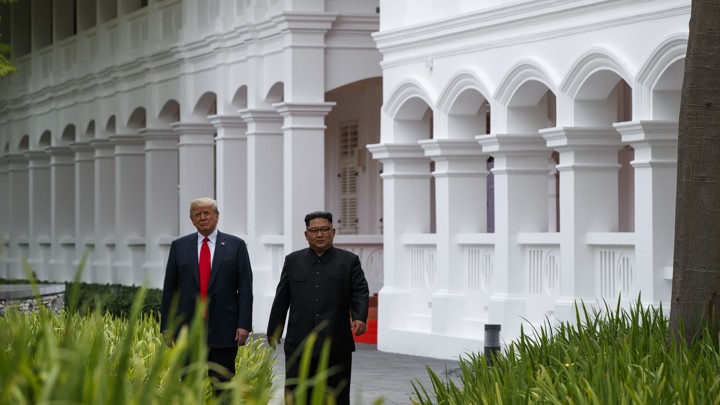The Singapore summit actually made the world a safer place. The president’s critics won’t admit it.

EVAN VUCCI / AP
The irony, therefore, is nearly irresistible. In his nuclear summit this week in Singapore, Trump gave up more—and got less—than Obama did with Iran. He flattered Kim Jong Un in ways Obama never flattered Hassan Rouhani or Ayatollah Khamenei. And so, having been offered a free shot on goal, congressional Democrats are taking it. It’s satisfying to expose your political adversaries as frauds.
But the Democrats are wrong. They’re not wrong that Trump proved a weaker, dumber negotiator than Obama. They’re wrong to suggest that makes the Singapore summit a failure. In their desire to prove themselves savvy and tough, Democrats are proving myopic. And they’re making themselves de facto allies of ultra-hawks like John Bolton, who may try to derail the Trump-Kim peace process, and revive the threat of war.
But by looking at the summit in isolation, Schumer is missing the larger tradeoff. Why might North Korea pose a threat to the United States? Because it has nuclear weapons that it may soon be able to place on missiles able to reach America. That’s why U.S.–North Korean relations last year fell into crisis. Pyongyang was making what The Washington Post called “astonishing improvements in North Korea’s ballistic-missile program,” and Trump responded by threatening war.
North Korea ended that crisis in April. Kim publicly announced a halt to North Korea’s nuclear tests and its intercontinental ballistic missile (ICBM) tests even though experts have detected no evidence that Pyongyang can yet put a nuclear weapon on a missile able to hit the U.S. Schumer can dismiss that as “vague and unverifiable.” But it’s hugely important.
According to Leon Sigal, the director of the Northeast Asia Cooperative Security Project at the Social Science Research Council, Kim did that because he wants a fundamentally different relationship with the United States. During the Cold War, Pyongyang maintained good relations with both the Soviet Union and China, and played the two against each other to maximize its independence. Since then, the USSR’s demise has made North Korea overwhelmingly dependent on Beijing, its only significant ally. And Kim, Sigal argues, like his father and grandfather, doesn’t like that. He fears the United States. But he also wants a rapprochement with the United States—and through that, with America’s allies Japan and South Korea—because he believes his country will be stronger, and his regime more secure, if North Korea has more than one powerful friend.
The Singapore summit showed Kim that Trump is open to that. And by doing so in such a dramatic way, Trump makes it easier for Kim to push denuclearization at home. By getting the summit, Kim can tell his generals—who have labored for decades building the North’s nuclear program—that his strategy is working. Trump shook his hand.
That wasn’t Trump’s only concession, of course. He also agreed to suspend American military exercises with South Korea. And he scandalized Democrats and many pundits by calling those exercises “provocative,” which is how North Korea describes them. But many of the exercises are indeed provocative. They simulate the invasion of North Korea and the decapitation of its regime. And they create pressure on the North to respond with provocative actions of its own. Cancelling them makes it easier for Kim to maintain his freeze on nuclear and missile tests, and move toward a freeze on the creation of the fissile material necessary for a bomb.
The more sophisticated critique of Trump’s concessions is that by embracing Kim he undermined the “maximum pressure” sanctions campaign that led Kim to shift his behavior. Already, for example, China has restarted flights to North Korea, which it suspended last November.
But this more sophisticated critique is probably wrong, too. It’s not at all clear that Kim launched his charm offensive in response to sanctions. After all, his father and grandfather said they wanted to end hostilities with America too. It’s more likely that what dictated Kim’s timing was his own military schedule. By conducting missile tests last year, he created facts on the ground and enhanced his bargaining power. Those actions gave substance to Kim’s claim, in his New Year’s address, that North Korea is now a nuclear power. Having achieved that, he was ready to reach out.
The critics who say Trump should have played hard to get in the face of Kim’s outreach, and thus sustained “maximum pressure,” aren’t reckoning with how South Korea and China would have reacted to such behavior. Remember: Kim’s charm offensive—at the Olympics in February and then at the Panmunjom summit in April—was directed first at Seoul, where it was rapturously reciprocated. Had Trump kept talking about fire and fury while Kim and Moon were embracing, he would have risked a major split with Seoul. “Maximum pressure” was possible in 2017 because Kim was testing missiles, which angered even China. Once he shifted course, it would have been difficult to maintain no matter what Trump did.
The second major Democratic criticism is that Trump apparently didn’t pressure Kim on North Korea’s horrific human-rights record. To the contrary, Trump said, “His country does love him,” which Democratic Senator Brian Schatz called “embarrassing” and an “abdication of American leadership.” When Trump said Kim “loves his country very much,” Representative Steve Cohen tweeted, “Loves it so much that he has them impoverished and enslaved except for those he murders.”
Fair enough. Trump’s comments were absurd and repugnant. He should have raised human rights in Singapore. David Hawk, a former executive director of Amnesty International USA, who has written several reports on North Korea’s labor camps, told me Trump, as a first step, could have asked Kim to allow representatives of the United Nations or the International Committee of the Red Cross to inspect those camps. He could also have asked Kim to stop imprisoning North Korean women who are forcibly repatriated from China and to allow families separated between North and South Korea to correspond and talk on the phone.
It’s impossible to know whether the normalization of relations with the United States, and greater investment from South Korea, China, and Japan, will strengthen or weaken North Korea’s totalitarian regime. But the sanctions that the United States has been piling up since the early 1990s have been wildly ineffective in loosening the Kim family’s hold on power. And even if lifting them doesn’t dislodge Kim either, it will at least mean North Koreans are less likely to starve.
It’s easy to understand why Democrats don’t want to give Trump credit. They’re conditioned to believe he’s lying, which he often is. And they’re infuriated that he can get away with behavior—like making surprise concessions and praising a brutal dictator—that would have gotten Obama tarred and feathered. But in declaring the summit a failure because Kim didn’t meet their rigid, and extremely ambitious, demands, Democrats are replicating the Republicans’ behavior during Obama’s negotiations with Iran.
Yes, America should press for as much denuclearization as possible. But when Trump says North Korea is “no longer a nuclear threat,” he’s not entirely wrong. What makes one country a threat to another is not only, or even mostly, its military capacity. It’s also their relationship. The Soviet nuclear threat to the United States didn’t diminish in the late 1980s primarily because Moscow slashed a certain number of warheads in the Intermediate-Range Nuclear Forces deal. It diminished because the U.S. and USSR were no longer enemies.
Trump, the ignoramus, is right that the relationship between America and North Korea matters more than the technical details of denuclearization. And by ridiculing Trump’s efforts because those details don’t meet their standards, Democrats are strengthening Bolton, who sabotaged the Trump–Kim peace process once, and may try to again. So, painful as it is, Democrats should give Trump the credit that, in this rare instance, he is due. In Singapore, two of the worst leaders in modern history met. And they made the world a safer place.
Source: https://www.theatlantic.com/international/archive/2018/06/trump-kim-jong-un-summit/562934/
[Disclaimer]








